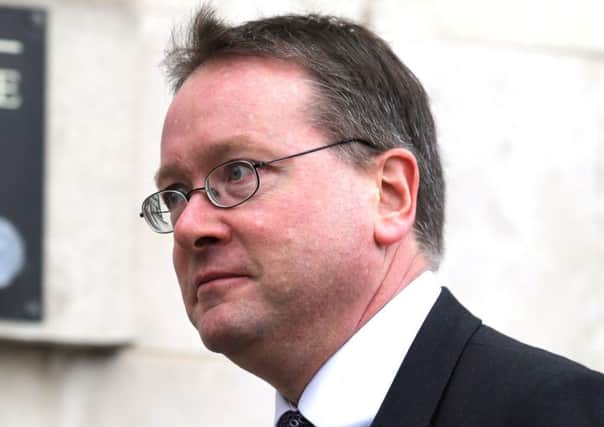Attorney General John Larkin: Abortion because of unborn child’s disability prohibited


Attorney General John Larkin QC also told the High Court that a Belfast woman challenging the near-blanket ban on terminations within the Province does not have the necessary victim status.
But counsel for Sarah Ewart countered that she has been forced to put off having any more children because of fears they would have the same fatal condition which led to her travelling to England for an abortion.
Advertisement
Hide AdAdvertisement
Hide AdFinal submissions came as judgment was reserved on her bid to change the strict regime in Northern Ireland.


Before rising after two days of argument, Mrs Justice Keegan said: “I obviously have a lot to think about.”
Unlike the rest of the UK, terminations are only legal in Northern Ireland where it is necessary to protect the woman’s life or if there is a serious risk to her well-being.
Last year a majority of Supreme Court judges held that those restrictions breach the UK’s human rights obligations.
Advertisement
Hide AdAdvertisement
Hide AdThey still rejected the case mounted by the Northern Ireland Human Rights Commission, however, because it did not have the necessary legal standing.
Mrs Ewart, 28, has now mounted a challenge in her own name as a woman directly affected by a ban she claims violates her human rights.
In 2013 she travelled to a London clinic after being told her unborn child had no chance of survival outside the womb due to a fatal foetal abnormality (FFA).
Her lawyers contended it should be highly persuasive that the Supreme Court decided, by a majority, the law in Northern Ireland is incompatible with Article 8 of the European Convention on Human Rights in fatal foetal abnormality (FFA) cases.
Advertisement
Hide AdAdvertisement
Hide AdThey said Mrs Ewart’s shock and horror at discovering her foetus had no skull or developed brain was compounded by enduring the trauma and humiliation of travelling to England for the procedure she likened to being “on a conveyor belt”.
But according to Mr Larkin, the United Nations Convention on the Rights of Persons with Disabilities extends to a prohibition on discrimination before birth – and has been designated as an EU treaty.
Arguing that every human being has the inherent right to life, he told the court: “The unborn child belongs to the human race.”
The attorney general went on: “Selecting out some unborn children for abortion on the basis of disability is prohibited.”
Advertisement
Hide AdAdvertisement
Hide AdAssertions that this includes FFA cases were disputed by counsel representing Mrs Ewart.
During submissions Mr Larkin also claimed her challenge must fail because no unlawful act required to obtain the necessary victim status exists.
He acknowledged that she went through a “dreadful experience” in 2013.
If Mrs Ewart had issued proceedings at that stage she could have declared herself a victim, the court heard.
Advertisement
Hide AdAdvertisement
Hide AdBut the Attorney General contended that it was abstract to suggest the same condition will occur in any future pregnancy.
However, Mrs Ewart’s barrister, Adam Straw, claimed the current abortion rules renders the mother of two a victim.
“She had had to put on hold her wish to have more children because of the concerns about the same trauma which happened to her in 2013 happening again,” he said.
Rejecting the idea of leaving the issue for any future restored administration at Stormont, Mr Straw stressed the urgency for his client and other women who find themselves in the same situation.
He added: “If this case is, to use a colloquial term, kicked into the long grass and sent back to the Assembly, there will be on any reading considerable delay before anything is done about it.”